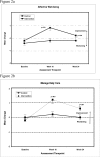Targeting and managing behavioral symptoms in individuals with dementia: a randomized trial of a nonpharmacological intervention
- PMID: 20662955
- PMCID: PMC2955191
- DOI: 10.1111/j.1532-5415.2010.02971.x
Targeting and managing behavioral symptoms in individuals with dementia: a randomized trial of a nonpharmacological intervention
Abstract
Objectives: To test the effects of an intervention that helps families manage distressing behaviors in family members with dementia.
Design: Two-group randomized trial.
Setting: In home.
Participants: Two hundred seventy-two caregivers and people with dementia.
Intervention: Up to 11 home and telephone contacts over 16 weeks by health professionals who identified potential triggers of patient behaviors, including communication and environmental factors and patient undiagnosed medical conditions (by obtaining blood and urine samples) and trained caregivers in strategies to modify triggers and reduce their upset. Between 16 and 24 weeks, three telephone contacts reinforced strategy use.
Measurements: Primary outcomes were frequency of targeted problem behavior and caregiver upset with and confidence managing it at 16 weeks. Secondary outcomes were caregiver well-being and management skills at 16 and 24 weeks and caregiver perceived benefits. Prevalence of medical conditions for intervention patients were also examined.
Results: At 16 weeks, 67.5% of intervention caregivers reported improvement in targeted problem behavior, compared with 45.8% of caregivers in a no-treatment control group (P=.002), and reduced upset with (P=.03) and enhanced confidence managing (P=.01) the behavior. Additionally, intervention caregivers reported less upset with all problem behaviors (P=.001), less negative communication (P=.02), less burden (P=.05), and better well-being (P=.001) than controls. Fewer intervention caregivers had depressive symptoms (53.0%) than control group caregivers (67.8%, P=.02). Similar caregiver outcomes occurred at 24 weeks. Intervention caregivers perceived more study benefits (P<.05), including ability to keep family members home, than controls. Blood and urine samples of intervention patients with dementia showed that 40 (34.1%) had undiagnosed illnesses requiring physician follow-up.
Conclusion: Targeting behaviors upsetting to caregivers and modifying potential triggers improves symptomatology in people with dementia and caregiver well-being and skills.
© 2010, Copyright the Authors. Journal compilation © 2010, The American Geriatrics Society.
Figures



References
-
- Chan D, Kasper JD, Black BS, et al. Presence of behavioral and psychological symptoms predicts nursing home placement in community-dwelling elders with cognitive impairment in univariate but not multivariate analysis. J Gerontol A Biol Sci Med Sci. 2003;58:548–554. - PubMed
-
- Savva GM, Zaccai J, Matthews FE, et al. Prevalence, correlates and course of behavioural and psychological symptoms of dementia in the population. Br J Psychiatry. 2009;194:212–219. - PubMed
-
- Tran P, Schmidt K, Gallo J, et al. Neuropsychiatric symptoms and medical illness in patients with dementia: An exploratory study. J Am Osteopath Assoc. 2006;106:412–414. - PubMed
-
- Beeri MS, Werner P, Davidson M, et al. The cost of Behavioral and Psychological Symptoms of Dementia (BPSD) in community dwelling Alzheimer's disease patients. Int J Geriatr Psychiatry. 2002;17:403–408. - PubMed
-
- Vugt MEd, Stevens F, Aalten P, et al. A prospective study of the effects of behavioral symptoms on the institutionalization of patients with dementia. Int Psychogeriatr. 2005;17:577–589. - PubMed
Publication types
MeSH terms
Grants and funding
LinkOut - more resources
Full Text Sources
Medical

